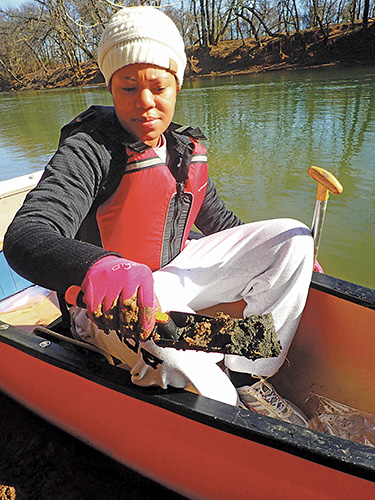Cleaning Up Coal Ash
For well over a century, power plants across the country have burned coal to generate electricity. And for just as long, leftover coal ash has been dumped in open, unlined pits near the power plant, usually located on a river or lake. Every year, U.S. power plants produce 130 million tons of coal ash, which is the second largest waste stream in the country after municipal garbage.
Coal ash concentrates the toxic heavy metals found in coal, including arsenic, mercury, lead and selenium. Stored in unlined, wet impoundments, coal ash has been leaking these toxics into our groundwater and surface waters for years. Sometimes these impoundments collapse — with disastrous results.
Yet government regulations for coal ash management are either non-existent or sparse, and there is little enforcement of the regulations that do exist. In North Carolina, this lack of oversight — and the complicity between state regulators, elected officials and Duke Energy — came to a boiling point in February 2014 when one of Duke’s coal ash impoundments spilled 39 million tons of ash into the Dan River.
Citizens living near North Carolina’s 33 coal ash impoundments — all of which have leaked — have fought for transparency from Duke and the state, and for cleanup of the pollution that threatens their property value, health and family. Their actions forced this issue into the headlines of news networks and to the forefront of environmental justice conversations in the United States.
Appalachian Voices stood with these communities as we worked for years to compel Duke Energy and the N.C. Department of Environmental Quality to excavate coal ash from all the North Carolina sites and dispose of it either in lined, dry landfills, away from waterways, or by recycling it for concrete or other uses, provided it’s done in a manner that protects public health and the environment.
On Jan. 2, 2020, North Carolina announced a historic settlement with one of the state’s most powerful corporations and polluters, Duke Energy. The settlement requires Duke to move nearly 80 million tons of toxic coal ash at six of its power plants to properly lined landfills onsite or recycle it.

Learn information about specific coal ash impoundments in the South, including health threats and safety ratings:
Additional Resources
Fact sheets, videos, links to academic research, and more
Sign Up to Act
Help us protect the health of our communities and waterways.
Latest News
Va. Transportation Panel Acts on Controversial Highway
Contact: Cat McCue, Communications Director, 434-293-6373, cat@appvoices.org The…
“Clean coal” is on the fritz

Coal Ash Management
The first federal regulations governing the disposal of toxic coal ash passed in December 2014. The rule provides some safeguards, but environmental advocates aren’t reassured. And in North Carolina, more than a year after the Dan River coal ash spill, communities living near the waste are still concerned about the pollution’s effects.
Walking the Walk of Preservation
History provides a sense of place. Increasingly, communities are building their own place in history, and finding that preserving the past and marketing it to visitors can also provide a boost in the present.
Smoke in the Hills: Wood Stoves in Appalachia
Some cherish wood heat as a renewable, inexpensive energy source that offsets fossil fuel use, but wood stoves have been under fire in recent years for smoke pollution. Despite their smoky reputation, wood stoves can be an efficient, low-impact heating source when operated and maintained correctly.
Appalachian Voices Book Club
Appalachia’s triumphs and tragedies, its beauty and mystery, and its people’s tenacity, love and good humor have long been enshrined in fiction. This year, the stories of the region’s struggles with coal are reaching a national audience thanks to two powerful new novels.









